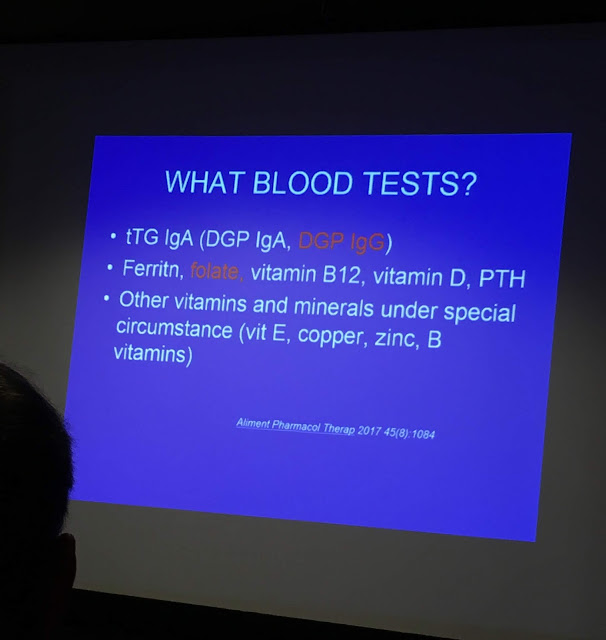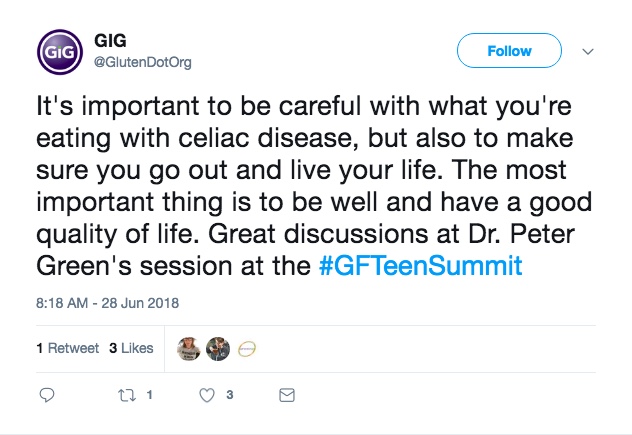Staying Healthy with Celiac Disease: 4 Takeaways from the First Gluten Free Teen Summit
What a crazy couple of weeks! If you follow me on Instagram, Facebook or Twitter, then you know that I ended June with a bang by attending the first annual Gluten Free Teen Summit in Orlando, Florida (aka, Disney World!).
This isn’t to say that you should just yell, “YOLO” and eat a wheat-filled Papa John’s pizza. However, you might consider taking educated risks like going out to restaurants that can’t guarantee 100% gluten free meals (which very few restaurants can actually do, these days) but promise to do their best. Getting glutened sucks, and you obviously want to avoid that as much as possible. However, accidents will happen...and the good news is that, according to Dr. Green, even if you feel like you’re dying when you’re glutened, you’re not. It would take a lot more repeat, large exposures to gluten to cause a big amount of damage to your intestines.
Ultimately, you have to do what you think makes you feel best - mentally and physically - and find your own balance between being careful to eat gluten free and living your life. Having a healthy mindset about your diet is important for your overall health, though, so try to make sure that celiac disease is part of your life but not ruling it.
I don’t think anyone offered a “solution” to this problematic feeling, but speakers did try to emphasize that celiac disease (or gluten intolerance, etc) is only part of your identity, not your whole identity. Yes, sometimes our dietary restrictions can make us feel "high maintenance." Yes, celiac disease, gluten intolerance or another medical condition that requires a certain diet can really feel like a big part of who we are.
However, what the Gluten Free Teen Summit really proved to me was that our diet is more a point of connection than an identity. It was amazing to watch just how quickly all of the gluten free teens bonded...but also to realize just how different everyone who ate the same diet really was. I'm never ashamed of my celiac disease or try to hide my diagnosis from others, but I do try to remember that I am also a college student, a foodie, a writer, a daughter, a sister and so much more than just a celiac - and I hope this post can remind you of all of the amazing other identities you have besides the one tied to your medical diagnosis.
Even though I was invited to attend as a speaker (I gave a presentation on what to do if your college doesn’t have safe gluten free options; most of the information I gave can be found here), I ended up learning a TON from the other gluten free teens, families and speakers. So I thought I’d share four of the key lessons I took away from the Gluten Free Teen Summit about staying healthy with celiac disease as a kid, teen and adult!
1. Follow up care, follow up care, did I mention follow up care?!?
The summit was lucky enough to feature Dr. Peter HR Green, Director of the Celiac Disease Center at Columbia University, as its keynote speaker. His presentation was packed with information, but I think one of the most important points was how important it is to get follow up care even after you’ve been diagnosed with celiac disease for several years. Like I always try to emphasize, I’m not a medical professional; all of the advice I give is based on my personal experiences as someone with celiac disease. So I’m not ashamed to admit that follow up care was a totally new concept to me. None of my doctors had ever brought it up, and I rarely saw it discussed online.
So what follow up care do I - and anyone else with celiac disease - need to get? According to Dr. Green, you should get a blood test to check for nutritional deficiencies (particularly ferritin, vitamin B12 and vitamin D) every year. That blood test should also check your celiac disease antibodies to make sure that you aren’t accidentally consuming gluten and still causing inflammation and intestinal damage. Dr. Green also suggests getting a follow-up biopsy (especially if you were diagnosed with celiac disease as a child and are transitioning to an adult doctor) to check for any remaining damage. The goal of both of these tests is to ensure that your gluten free diet is going well and doing everything it’s supposed to.
2. Be careful and try to eat gluten free...but don't let celiac disease or dietary restrictions control your life.
One of the most challenging and controversial moments of Gluten Free Teen Summit was when Dr. Green talked about taking educated risks when following a gluten free diet. Obviously, when you have celiac disease and know repeat exposures to gluten can cause intestinal damage and other nasty symptoms, you and your family probably like to be extra cautious when eating out and worry about cross contamination.
However, Dr. Green pointed out people who are hypervigilant about their gluten free diets (to the point of never eating out or only eating things clearly labeled “gluten free,” even vegetables) are actually following a maladaptive thinking process and experience more negative feelings like depression, anxiety, etc. (I know first-hand how dangerous these thoughts can be; after my celiac diagnosis, I became afraid of all food, even "unhealthy" gluten free food, for some time).
This isn’t to say that you should just yell, “YOLO” and eat a wheat-filled Papa John’s pizza. However, you might consider taking educated risks like going out to restaurants that can’t guarantee 100% gluten free meals (which very few restaurants can actually do, these days) but promise to do their best. Getting glutened sucks, and you obviously want to avoid that as much as possible. However, accidents will happen...and the good news is that, according to Dr. Green, even if you feel like you’re dying when you’re glutened, you’re not. It would take a lot more repeat, large exposures to gluten to cause a big amount of damage to your intestines.
Ultimately, you have to do what you think makes you feel best - mentally and physically - and find your own balance between being careful to eat gluten free and living your life. Having a healthy mindset about your diet is important for your overall health, though, so try to make sure that celiac disease is part of your life but not ruling it.
3. Colleges are making big improvements in their accommodations for gluten free students.
Like I mentioned earlier, I gave a presentation all about how to survive college if your school doesn’t offer safe, gluten free options. While preparing for my speech, I spent a good amount of time researching gluten free diets in colleges nowadays and was impressed by how many colleges now offer 100% gluten free cafeterias, gluten free certified bakeries, locked rooms with allergy free products and cooking tools, and other accommodations.
Here’s one pro tip I learned from one of the families at the gluten free Teen Summit: when you contact the dietitian of colleges you are considering applying to, ask them to make a sample gluten free meal for you to try when you visit the campus. Not only will this allow you to get a better idea of their cafeteria's celiac or gluten free protocol, but it also lets you see how the food tastes. After all, we don’t just need to eat gluten free in college; we’d like to eat delicious food, too!
If you’re wondering about the most helpful tips (according to Summit attendants) included in my presentation, families seemed to especially appreciate my advice to:
- Reach out to your college's Disability Resource Center, even if your college has amazing gluten free options and you don't think you'll need any accommodations.
- Request permission to have your own separate, small freezer in your dorm room and/or college apartment for storing emergency gluten free frozen meals, leftovers, other ingredients, etc.
- Get creative with cafeteria accommodations, like when I asked to be able to take food out of the cafeteria to ensure I'd have time to get all the calories I needed.
I ended my presentation by saying that going to college with celiac disease or while needing a gluten free diet can be challenging...however, YOU have the power to shape your college experience by researching, educating others and always advocating for yourself and your health! To find out more about the college presentations at the Gluten Free Teen Summit, check out this awesome recap.
4. Repeat after me: "I am not my disease."
At one point during the Gluten Free Teen Summit, I got to take part in a teen panel in which I and other gluten free teens answered common questions about living gluten free. One of the most heartbreaking moments was when we were asked who ever felt like a burden because of their dietary limitations...and almost everyone in the room (including me) raised their hand.
I don’t think anyone offered a “solution” to this problematic feeling, but speakers did try to emphasize that celiac disease (or gluten intolerance, etc) is only part of your identity, not your whole identity. Yes, sometimes our dietary restrictions can make us feel "high maintenance." Yes, celiac disease, gluten intolerance or another medical condition that requires a certain diet can really feel like a big part of who we are.
However, what the Gluten Free Teen Summit really proved to me was that our diet is more a point of connection than an identity. It was amazing to watch just how quickly all of the gluten free teens bonded...but also to realize just how different everyone who ate the same diet really was. I'm never ashamed of my celiac disease or try to hide my diagnosis from others, but I do try to remember that I am also a college student, a foodie, a writer, a daughter, a sister and so much more than just a celiac - and I hope this post can remind you of all of the amazing other identities you have besides the one tied to your medical diagnosis.
The First Gluten Free Teen Summit: A Summary
If I had to describe how I felt at the end of the Gluten Free Teen Summit in one word, it would have to be "grateful." Grateful to meet gluten free eaters and experts from all over the United States, including two of my fave online blogging pals - Erica from Celiac and the Beast and Taylor from Hale Life - in person for the first time. Grateful to hear of new groundbreaking developments in the gluten free community, like pills that could help celiacs feel even healthier on a gluten free diet. Grateful to experience three days where everyone just "got it" and we could learn and grow from one another's stories.
Like this post? Tweet me some love by clicking here: "Have #celiacdisease, need to eat #glutenfree or know someone who does? Check out everything I learned about staying healthy with #celiac at the first annual #GFTeenSummit! Read it all here --> http://bit.ly/2KqEOmR"
And, of course, grateful that Generation Gluten Free and The Gluten Intolerance Group let me be a part of this inaugural event! Even if you weren't able to attend, I hope that this post taught you something new, helped you feel more connected to the gluten free community or, as cliche as it sounds, let you feel a little bit of that Disney World magic!
No questions today. Just tell me your thoughts!









This is awesome! How do we find out about future events? Do you know where it will be held next year?
ReplyDeleteThey are already fundraising for next year and have some more information here: https://donorlynk.com/gluten/campaigns/teen-summit/
DeleteThank you!
DeleteVeery nice blog you have here
ReplyDelete